“Let food be thy medicine and medicine be thy food.” – Hippocrates
As a proud owner of a bearded dragon, I know firsthand the importance of providing a healthy diet for these magnificent creatures. Just like humans, bearded dragons require a well-balanced and nutritious diet to thrive and maintain their overall health and well-being. From live insects to a variety of vegetables, understanding the dietary needs of your bearded dragon is essential to ensuring they lead a happy and fulfilling life.
Key Takeaways
- Bearded dragons are omnivores and should be fed a diverse diet of live insects, greens, vegetables, and limited amounts of fruit.
- The diet of a juvenile bearded dragon should consist of 80% bugs and 20% plants, while adult bearded dragons should have a diet made up of 80% plants and 20% insects.
- Live insects, such as crickets and mealworms, are recommended as a protein source for bearded dragons.
- A variety of vegetables, including kale, squash, and bell peppers, should be included in a bearded dragon’s diet.
- Fruits should be given on a limited basis as a treat, as they are low in mineral content compared to other food sources.
What Can Bearded Dragons Eat: Live Food
When it comes to the diet of bearded dragons, live food plays a crucial role in providing essential nutrients and mimicking their natural diet. Bearded dragons can eat a variety of live insects, which not only gives them a diverse range of food but also stimulates their hunting instincts.
The best food options for bearded dragons include crickets, mealworms, earthworms, butterworms, silkworms, superworms, cockroaches, wax worms, king worms, and hornworms. Live crickets, in particular, are highly beneficial as they offer both nutritional value and mental stimulation, replicating what a bearded dragon would eat in the wild.
What sets live insects apart from their dried counterparts is their higher water content and the fact that they are more enjoyable for bearded dragons to eat. However, it’s crucial to consider factors such as nutritional value, ease of storing, and cost when purchasing live insects for your dragon.
Gut loading, or feeding nutritious food to the live insects before offering them to your bearded dragon, is important for optimal nutrition. This ensures that your dragon receives a well-balanced diet with all the necessary vitamins and minerals.
“Live insects provide essential nutrients and enrichment for bearded dragons, enhancing their overall health and well-being.” – Veterinarian
While live insects are a staple in a bearded dragon’s diet, it’s important to avoid feeding them wild-caught insects. Wild insects may carry diseases or parasites that can harm your dragon’s health. Therefore, sourcing insects from reputable breeders or pet stores is highly recommended.
Table: Nutritional Comparison of Common Live Insects for Bearded Dragons
| Insect | Protein Content | Fat Content | Calcium Content |
|---|---|---|---|
| Crickets | 69-75% | 6-15% | Ca:P Ratio – 1:8 |
| Mealworms | 20-22% | 12-17% | Ca:P Ratio – 1:12 |
| Superworms | 19-20% | 17-19% | Ca:P Ratio – 1:17 |
| Phoenix Worms | 14-15% | approximately 4% | Ca:P Ratio – 1:1.5 |
| Dubia Roaches | 36-49% | 22-30% | Ca:P Ratio – 1:3 |
As with any aspect of caring for a bearded dragon, it’s essential to consult with a veterinarian to ensure you are providing the best food and diet for your specific dragon’s needs.
What Can Bearded Dragons Eat: Vegetables
Bearded dragons can enjoy a wide selection of vegetables as part of their nutritious diet. These vegetables provide essential nutrients and contribute to a well-rounded feeding regimen for these reptiles. Incorporating a variety of vegetables ensures that bearded dragons receive a balanced and wholesome diet.
Some vegetables that are safe and appropriate for bearded dragons include:
- Kale
- Asparagus
- Butternut squash
- Yellow squash
- Acorn squash
- Spaghetti squash
- Butterworms
- Celery
- Peeled cucumber
- Yams
- Turnip greens
- Collard greens
- Mustard greens
- Zucchini
- Okra
- Radicchio
- Bell peppers
- Cabbage
- Artichoke heart
- Bok choy
- Carrots
- Endive
- Pumpkins
- Parsnips
- Cooked lentils
- Chicory
These vegetables provide a range of essential nutrients, vitamins, and minerals that promote a healthy and thriving bearded dragon. Raw vegetables are a more natural option and retain more of their nutrients, but cooked vegetables can also be provided.
While most vegetables are suitable for bearded dragons, there are a few exceptions. Leafy greens such as swiss chard, spinach, and beet greens contain oxalates that can bind calcium and other trace minerals, which may lead to nutritional deficiencies over time. These greens should be given in limited quantities to prevent any potential issues.
To visualize the variety of vegetables that bearded dragons can eat, refer to the table below:
| Vegetable | Safety |
|---|---|
| Kale | Safe |
| Asparagus | Safe |
| Butternut squash | Safe |
| Yellow squash | Safe |
| Acorn squash | Safe |
| Spaghetti squash | Safe |
| Bell peppers | Safe |
| Carrots | Safe |
| Cabbage | Safe |
| … | … |
Remember to thoroughly wash all vegetables before feeding them to your bearded dragon to remove any potential pesticides or contaminants. Always consult with a veterinarian for specific feeding guidelines and to ensure the safety and well-being of your pet.
What Can Bearded Dragons Eat: Fruits
Bearded dragons, when offered in moderation, can enjoy a variety of fruits as a delicious treat. While fruits provide vitamins and natural sugars, they should not make up the main part of a bearded dragon’s diet due to their low mineral content compared to other food sources. It’s important to remember that moderation is key when it comes to feeding fruits to your bearded dragon.
Safe fruits for bearded dragons include:
- Apples
- Peaches
- Strawberries
- Apricots
- Blackberries
- Blueberries
- Cranberries
- Cherries
- Chayote
- Figs
- Grapes
- Grapefruit
- Melons
- Plum
- Watermelon
- Guava
- Nectarine
- Prunes
- Raisins
- Pears
- Pineapple
- Papaya
When feeding fruits to your bearded dragon, it’s important to cut them into bite-sized pieces to make them easier to eat and digest. Additionally, be mindful of the frequency of fruit consumption to prevent overfeeding and potential digestive issues.
Feeding Guidelines for Bearded Dragons
Feeding bearded dragons the right diet is crucial for their overall health and well-being. The feeding guidelines for bearded dragons vary depending on their age, ensuring they receive the essential nutrients they need to thrive.
Juvenile Bearded Dragons: 80% Bugs and 20% Plants
When bearded dragons are young, their diet should consist of approximately 80% bugs and 20% plants. This means that the majority of their meals should come from live insects, such as crickets, mealworms, and silkworms. These insects are packed with protein and provide important nutrients for their growth.
In addition to insects, it is important to include a variety of plants in their diet. Offer a range of leafy greens and vegetables, such as kale, collard greens, and bell peppers. These plants provide vital vitamins and minerals that contribute to their overall health.
Adult Bearded Dragons: 80% Plants and 20% Insects
As bearded dragons mature, their diet should shift to primarily consist of plants. Adult bearded dragons should consume around 80% plants and 20% insects. This ensures they receive a balanced diet that meets their nutritional needs without excessive protein intake.
Include a diverse range of vegetables and leafy greens in their daily meals. This can include items like butternut squash, green beans, and carrots. Varying the vegetables helps provide them with a wide array of essential nutrients.
Feeding Speed and Monitoring
When feeding your bearded dragon, allow them a certain amount of time to eat. Offer live insects for about 10 minutes, while fruits and vegetables can be left in their enclosure for approximately 30 minutes. This helps prevent overfeeding and ensures that any uneaten food does not become moldy or compromise their health.
Monitor your bearded dragon’s weight regularly and consult with a veterinarian to ensure they are receiving the appropriate amount of food and essential nutrients. Adjust their diet as needed based on their growth, health, and dietary needs.
| Age | Protein (insects) | Plants and Vegetables | Fruits |
|---|---|---|---|
| Juvenile | 80% | 20% | Limited quantities |
| Adult | 20% | 80% | Limited quantities |
Remember, each bearded dragon is unique, so it’s essential to observe their eating habits, adjust their diet accordingly, and consult with a veterinarian for personalized feeding guidelines. By providing the right balance of protein, plants, and nutrients, you can ensure your bearded dragon’s health and happiness.
Bearded Dragon Diet Considerations
When it comes to feeding your bearded dragon, there are several important considerations to keep in mind to ensure their health and well-being. Here are some key factors to consider:
- Avoid feeding smaller bearded dragons in tanks with loose substrate to prevent ingestion of the substrate. This can lead to digestive issues and blockages.
- Older bearded dragons may be able to tolerate a small amount of substrate, but it is still important to exercise caution and monitor their behavior closely.
- Avoid feeding wild insects to your bearded dragon as they may carry diseases or parasites that can be harmful to their health.
- Prior to feeding insects to your bearded dragon, make sure to “gut load” them by feeding them a nutritious diet. This ensures that your bearded dragon receives a variety of nutrients from their prey.
- Ensure a well-balanced diet for your bearded dragon by offering a mix of insects, vegetables, and occasional fruits. This helps to provide the essential nutrients they need.
- When feeding insects, provide a shallow and clean dish to prevent them from escaping and to make it easier for your bearded dragon to catch and consume them.
- Similarly, provide a separate dish for vegetables to prevent them from becoming mixed with the insects’ waste and to promote good hygiene.
- Offer a variety of vegetables and rotate them regularly to provide a diverse range of nutrients for your bearded dragon’s overall health.
- Ensure that water is always available in a clean dish, and consider misting or soaking your bearded dragon to keep them hydrated. This is particularly important for younger dragons or those in warm environments.
- Use UV light to provide your bearded dragon with the necessary amount of vitamin D3, which aids in calcium absorption. This helps to prevent metabolic bone disease.
- Consider adding supplements, such as calcium and multivitamins, to your bearded dragon’s diet to ensure they receive all the essential nutrients they need. Consult with a veterinarian to determine the specific requirements for your dragon based on factors such as age, weight, and health status.
By taking these diet considerations into account, you can provide your bearded dragon with a healthy and well-balanced diet that meets their essential nutrient needs.
Safe and Harmful Food for Bearded Dragons
Bearded dragons can safely eat a wide variety of food, but it is important to be aware of what foods to avoid. Providing appropriate and safe food for bearded dragons is vital for their health and well-being.
Safe Foods for Bearded Dragons
Bearded dragons thrive on a diet that includes various insects, vegetables, and fruits. These foods provide essential nutrients and contribute to the overall health of your pet.
Some safe foods for bearded dragons include:
- Insects: crickets, mealworms, silkworms, superworms
- Vegetables: kale, butternut squash, bell peppers
- Fruits: apples, strawberries, blueberries
These foods offer a diverse range of nutrients that support the bearded dragon’s growth and development. However, it is essential to practice moderation and provide a balanced diet.
Foods to Avoid
While many foods are safe for bearded dragons, certain items should be avoided due to potential hazards. These foods may be toxic or pose digestive issues for your pet.
Avoid feeding bearded dragons the following:
- Insects from the wild
- Dead insects
- Elderbugs and fireflies
- Venomous insects
- Vegetables low in nutrients, such as lettuce
- Unsafe fruits, such as avocados and citrus fruits
- Mushrooms, rhubarb, and wild plants
Feeding these foods to your bearded dragon can lead to health issues or nutritional deficiencies. It is crucial to research and consult with a veterinarian to ensure the foods you offer are safe and appropriate.
Providing a Healthy Diet
Creating a well-rounded diet for your bearded dragon is key to their optimal health and longevity. By offering a variety of safe foods, you can provide them with the necessary nutrients for their well-being.
| Safe Foods | Avoided Foods |
|---|---|
| Insects: crickets, mealworms, silkworms, superworms | Insects from the wild, dead insects |
| Vegetables: kale, butternut squash, bell peppers | Vegetables low in nutrients, such as lettuce |
| Fruits: apples, strawberries, blueberries | Unsafe fruits, such as avocados and citrus fruits |
Remember, providing a varied diet along with appropriate supplementation and a clean water source are crucial factors in maintaining your bearded dragon’s overall health and well-being.
Importance of Calcium and Vitamin Supplements
Calcium and vitamin supplements are essential for the overall health and well-being of your bearded dragon. These supplements provide crucial nutrients that help prevent diseases and maintain proper bodily functions. It is important to understand why calcium and vitamins are vital for your bearded dragon’s diet.
Calcium for Strong and Healthy Bones
Calcium is a critical mineral that plays a crucial role in maintaining strong and healthy bones for your bearded dragon. A deficiency in calcium can lead to metabolic bone disease, a condition that can cause deformities, fractures, and even death. To ensure your bearded dragon receives sufficient calcium, it is recommended to lightly sprinkle a phosphorus-free calcium powder on their food every day.
Vitamin D3 for Calcium Absorption
Vitamin D3 is necessary for the proper absorption of calcium in your bearded dragon’s body. It aids in converting inactive calcium into an active form that can be utilized by their bones and other bodily functions. Some calcium supplements also contain vitamin D3, ensuring that your bearded dragon receives the necessary amount to support their overall health.
Multivitamin Supplements for Optimal Health
In addition to calcium and vitamin D3, multivitamin supplements can provide additional essential nutrients that contribute to your bearded dragon’s overall health and vitality. These supplements may contain a combination of vitamins, minerals, and other beneficial ingredients that promote proper growth, immune function, and organ health.
It is important to consult with a veterinarian to determine the specific supplementation needs of your bearded dragon. They can assess their age, weight, and overall health to provide tailored recommendations for the appropriate dosage and frequency of supplements.
Common Calcium and Vitamin Supplements for Bearded Dragons
| Supplement | Benefits |
|---|---|
| Repti Calcium | Contains pure calcium carbonate for optimal bone health |
| Rep-Cal Calcium with Vitamin D3 | Provides calcium and essential vitamin D3 for proper calcium absorption |
| Zoo Med ReptiVite | Includes a variety of essential vitamins and minerals for overall health |
| Herptivite Multivitamin | Offers a comprehensive blend of vitamins and minerals for optimal nutrition |
Remember, while supplements are important, they should not replace a well-balanced diet that includes a variety of appropriate insects, vegetables, and occasional fruits. Consistency and moderation are key to providing your bearded dragon with the essential nutrients they need to thrive.
Hydration and Lighting Needs for Bearded Dragons
Bearded dragons, like humans, need proper hydration for their overall health and well-being. While they obtain most of their moisture from the fruits and vegetables they consume, it is still essential to provide them with access to fresh water. Make sure to have a shallow dish of water available at all times. Although some bearded dragons may prefer to soak in the water rather than drink from it, it is still important to change the water frequently to ensure cleanliness and prevent any bacterial growth.
In addition to providing access to water, misting your bearded dragon and giving them regular soakings in warm water can also help keep them hydrated. This is especially important during shedding, as it helps soften their skin and aids in the shedding process. Soaking your bearded dragon in warm water for about 15-20 minutes, up to their belly, can also promote hydration and assist in alleviating any constipation issues.
Alongside hydration, proper lighting is also crucial for the health of your bearded dragon. Ultraviolet (UV) light is essential for bearded dragons to synthesize vitamin D3, which is responsible for calcium absorption. Without adequate UV light exposure, bearded dragons can develop metabolic bone disease and other health problems. It is important to follow lighting guidelines and provide the appropriate type and intensity of UV light for optimal health.
Regularly monitoring the hydration and lighting needs of your bearded dragon can help ensure they are receiving the proper care. If you have any concerns or questions about the best ways to provide hydration or lighting for your bearded dragon, it is always a good idea to consult with a veterinarian who specializes in reptiles. They can provide expert guidance tailored to your bearded dragon’s specific needs.
FAQ
What should bearded dragons eat?
Bearded dragons are omnivores and should eat a diverse diet that includes a variety of live insects, vegetables, and limited amounts of fruit.
What insects can bearded dragons eat?
Bearded dragons can safely eat a variety of live insects, including crickets, mealworms, earthworms, silkworms, and more. However, it is important to avoid feeding them wild insects.
What vegetables can bearded dragons eat?
Bearded dragons can eat a variety of vegetables, such as kale, squash, bell peppers, and more. However, some vegetables like lettuce should be avoided or given in limited quantities.
Can bearded dragons eat fruit?
Yes, bearded dragons can eat a variety of fruits on a limited basis, including apples, strawberries, grapes, and more. However, fruits should not be a main part of their diet.
What are the feeding guidelines for bearded dragons?
Juvenile bearded dragons should have a diet consisting of 80% bugs and 20% plants, while adult bearded dragons should have a diet of 80% plants and 20% insects. It is important to let the bearded dragon determine how much they should eat within a certain time frame.
What should I consider when feeding a bearded dragon?
When feeding a bearded dragon, consider factors such as avoiding loose substrate, providing a variety of insects and vegetables, offering fresh water, using UV light for vitamin D3 synthesis, and consulting with a vet for specific dietary needs.
What foods should be avoided for bearded dragons?
Bearded dragons should not eat wild insects, elderbugs, fireflies, or venomous insects. Certain vegetables like lettuce and high-fiber greens should be avoided, as well as avocado, mushrooms, and citrus fruits.
Why are calcium and vitamin supplements important for bearded dragons?
Calcium and vitamin supplements are important for preventing metabolic bone disease and ensuring optimal nutrition for bearded dragons. Consult with a vet for specific supplementation needs.
How should I ensure hydration and lighting needs for my bearded dragon?
Bearded dragons obtain moisture from fruits and vegetables but should also have access to fresh water. Regular misting and soaking, as well as the appropriate use of UV light, are essential for their hydration and vitamin D3 synthesis.



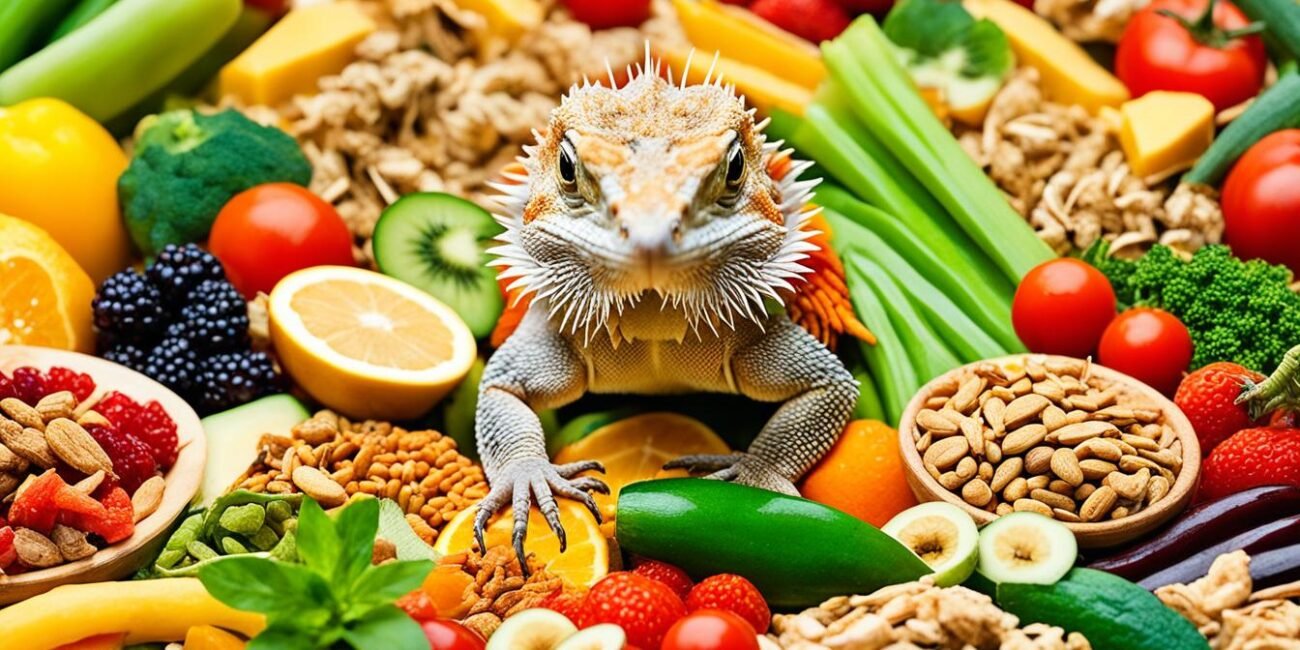
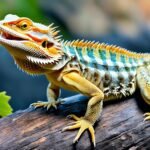
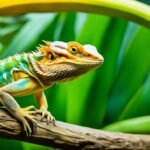


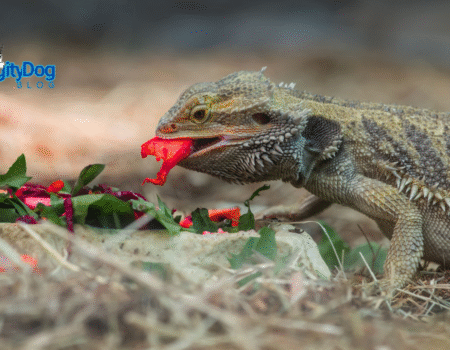
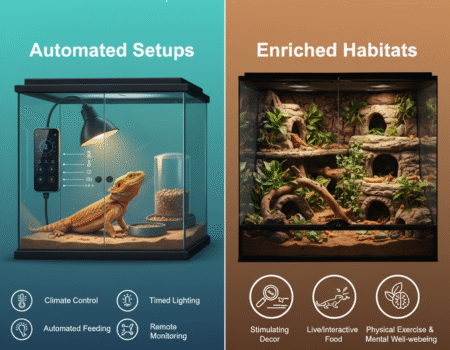
No Comment! Be the first one.